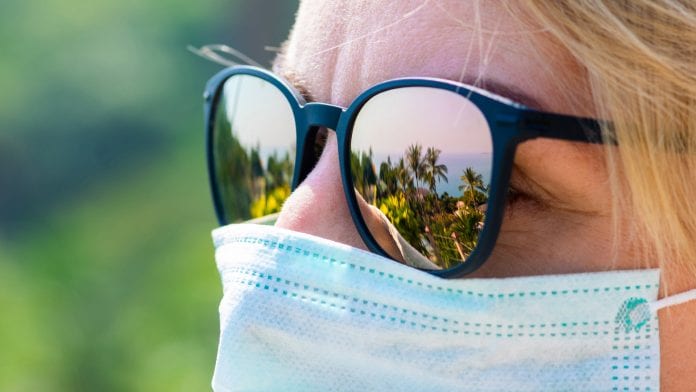
Researchers have developed a special type of cotton face mask that kills up to 99.9999% of bacteria and viruses within 60 minutes of being exposed to the light of the sun.
One time use face masks currently litter streets across the globe as many people wear them to protect themselves in public spaces from the COVID-19 pandemic. These masks become covered in viruses and bacteria and can easily be transferred to the face or elsewhere when the wearer removes or touches the mask if they are not careful.
Now, researchers reporting in the journal ACS Applied Materials & Interfaces have developed a special type of cotton face mask that kills up to 99.9999% of bacteria and viruses within 60 minutes of daylight exposure.
Killing microbes by exposing them to light
Face masks made of various cloth materials are effective at filtering nanoscale aerosol particles, such as those released by a cough or sneeze, however, live bacteria and viruses on the surface of the mask could still be contagious.
To tackle this issue, Peixin Tang, Gang Sun, Nitin Nitin, and colleagues from the University of California have developed a new cotton fabric that can release reactive oxygen species (ROS) when exposed to daylight, killing microbes attached to the fabric’s surfaces. The face masks remain washable, reusable, and safe for the wearer.
With the ability to be disinfected by sunlight, people are able to disinfect the mask during their lunch hour outside in the sun, for example, or by spending a longer period of time under office or building lights, which are much less intense than sunlight.
The researchers made the antimicrobial fabrics by attaching positively charged chains of 2-diethylaminoethyl chloride (DEAE-Cl) to ordinary cotton, then they dyed the modified cotton in a solution of a negatively charged photosensitiser (a compound that releases ROS upon exposure to light), which attached to the DEAE chains by strong electrostatic interactions.
The team‘s results demonstrated that a fabric made with a dye called ‘rose Bengal’ as the photosensitiser killed 99.9999% of the bacteria added to the fabric within 60 minutes of daylight exposure. It also inactivated 99.9999% of T7 bacteriophage, a virus thought to be more resistant to ROS than some coronaviruses, within 30 minutes.
The researchers have demonstrated that this material can be handwashed at least ten times and constantly exposed to daylight for at least seven days without losing its antimicrobial activity. The researchers say that the fabric could enable the creation of reusable, antibacterial/antiviral cloth face masks and protective suits.








